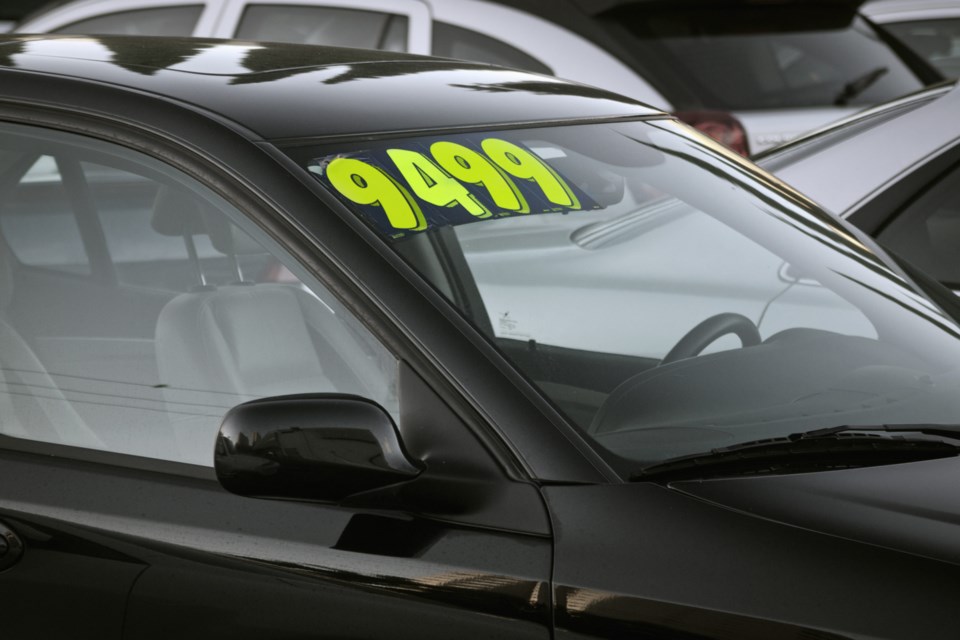If you’re in the market for a used car and find yourself scrolling Craigslist, Facebook Marketplace, and other sites for a deal, take note: Whatever price you haggle will soon be irrelevant when it comes to paying BC taxes on the deal.
The BC government last week passed major changes to how you’ll pay the Provincial Sales Tax (PST) on used vehicles.
If it’s a zero-emission electric vehicle with at least 6,000 kilometres on the odometer, it’s now exempt from the province’s 12 per cent PST entirely, whether from a car dealership or through a private sale.
But if you’re buying a traditional gas or diesel powered automobile, the amount of PST you owe will likely be going up.
That’s because starting Oct. 1, the PST in a private auto sale will be based upon the vehicle’s black book market value, not on the sweet deal you might have negotiated with the buyer.
That means, even if you haggled the seller down to a $12,000 purchase on your car, with the expectation of $1,440 of PST, when you go to register the car with ICBC the clerk might tell you the black book value is actually $14,000 and charge you an additional $240 in extra tax.
In short: The government sets the price of your used car, not you.
“It’s sending an unbelievably terrible message,” said BC Liberal leader Kevin Falcon.
“At the same time that they are dinging low-income folks that are just trying to get a break on a used vehicle, they’re providing massive subsidies to higher-income people that are buying Teslas and electric vehicles.”
The budget is clear on who the change is going to impact most.
“Individuals involved in private vehicle transactions are more likely to be low to medium income, living in a rural area, and male,” the budget reads.
Compare that to the description for dropping the PST from used electric vehicles. “The prevalence of zero-emission vehicle ownership is greatest among households with annual incomes over $150,000.”
Finance Minister Selina Robinson described the change as aiming to address a “loophole” in which people could under-report a private sale price to avoid a higher PST bill.
An audit from her Finance Ministry showed 90 per cent of 2,500 private used vehicle transfers found a “significant tax compliance gap” on private vehicle sales. Government estimates it would recover $30 million in missing PST revenue with the change, and points out that other provinces already use a similar system in calculating the tax.
But Robinson also acknowledged the potential new hurdles this will place on buyers.
When someone arrives at an ICBC office to transfer title of their new used vehicle, the clerk will simply look up the appraised value in the black book and apply that price – whether or not the vehicle has been in an accident or has other dints, cracks, and problems that could lower the real value.
It will be up to drivers to get an independent appraisal of the vehicle if they want to fight ICBC’s book value, something that will add time and money to a transaction.
“We're the only province that has a sales tax that doesn't use this system,” Robinson said in the house during debate last week.
“If all the other provinces have figured out how to make a system fair so that everyone is paying fairly — everyone right across the country is doing it, except for Alberta, where they don't have a sales tax — I'm sure that we can figure out, as well, how to make it as simple and seamless as possible.”
Part of the change may be to address a “loophole” in PST and bring BC into compliance with other provinces, as the minister says.
But the push and pull of the tax changes are clear: BC wants you to buy an electric vehicle to help it achieve its Clean BC climate plan.
If the province can incentivize people toward a used electric vehicle purchase, they are much more likely to stick with a new EV in the future, moving BC toward its target of 100 per cent new EV sales by 2035.
Still though, the optics for the BC NDP government are complicated, as it gives wealthy electric vehicle owners a tax break and ratchets up the hurdles and costs for lower-income British Columbians stuck buying an older gas-powered car.
The BC Liberals tried last week to amend the budget bill to exempt all used vehicle purchase under $20,000 from PST as a break to lower-income buyers – a move that could have saved up to $2,400 in PST per transaction.
But the BC NDP used its majority to reject the amendment.
The budget bill containing the used car tax changes has passed committee stage, meaning it’s functionally approved by the legislature and the new way of buying gas-powered used vehicles will come into effect later this fall.
Rob Shaw has spent more than 13 years covering BC politics, now reporting for CHEK News and writing for The Orca. He is the co-author of the national best-selling book A Matter of Confidence, and a regular guest on CBC Radio.



